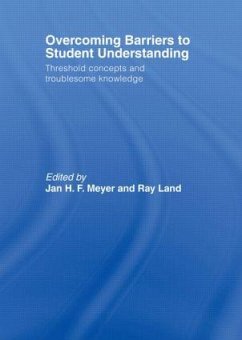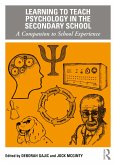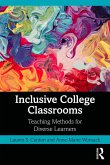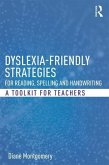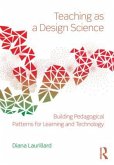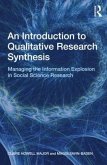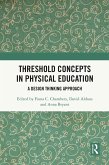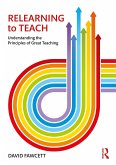Jan Meyer (UK University of Durham), Ray Land
Overcoming Barriers to Student Understanding
Threshold Concepts and Troublesome Knowledge
Jan Meyer (UK University of Durham), Ray Land
Overcoming Barriers to Student Understanding
Threshold Concepts and Troublesome Knowledge
- Broschiertes Buch
- Merkliste
- Auf die Merkliste
- Bewerten Bewerten
- Teilen
- Produkt teilen
- Produkterinnerung
- Produkterinnerung
This book examines the difficulties of student learning and offers advice on how to overcome them through course design, assessment practice and teaching methods.
Andere Kunden interessierten sich auch für
![Learning to Teach Psychology in the Secondary School Learning to Teach Psychology in the Secondary School]() Learning to Teach Psychology in the Secondary School36,99 €
Learning to Teach Psychology in the Secondary School36,99 €![Inclusive College Classrooms Inclusive College Classrooms]() Lauren S. CardonInclusive College Classrooms34,99 €
Lauren S. CardonInclusive College Classrooms34,99 €![Dyslexia-friendly Strategies for Reading, Spelling and Handwriting Dyslexia-friendly Strategies for Reading, Spelling and Handwriting]() Diane Montgomery (Middlesex University, London, UK)Dyslexia-friendly Strategies for Reading, Spelling and Handwriting44,99 €
Diane Montgomery (Middlesex University, London, UK)Dyslexia-friendly Strategies for Reading, Spelling and Handwriting44,99 €![Teaching as a Design Science Teaching as a Design Science]() Diana Laurillard (UK University of London)Teaching as a Design Science50,99 €
Diana Laurillard (UK University of London)Teaching as a Design Science50,99 €![An Introduction to Qualitative Research Synthesis An Introduction to Qualitative Research Synthesis]() Claire Howell Major (USA University of Alabama)An Introduction to Qualitative Research Synthesis49,99 €
Claire Howell Major (USA University of Alabama)An Introduction to Qualitative Research Synthesis49,99 €![Threshold Concepts in Physical Education Threshold Concepts in Physical Education]() Threshold Concepts in Physical Education45,99 €
Threshold Concepts in Physical Education45,99 €![Relearning to Teach Relearning to Teach]() David Fawcett (Secondary school teacher and International educationRelearning to Teach36,99 €
David Fawcett (Secondary school teacher and International educationRelearning to Teach36,99 €-
-
-
This book examines the difficulties of student learning and offers advice on how to overcome them through course design, assessment practice and teaching methods.
Produktdetails
- Produktdetails
- Verlag: Taylor & Francis Ltd
- Seitenzahl: 240
- Erscheinungstermin: 22. März 2012
- Englisch
- Abmessung: 234mm x 156mm x 13mm
- Gewicht: 366g
- ISBN-13: 9780415514187
- ISBN-10: 0415514185
- Artikelnr.: 37388269
- Herstellerkennzeichnung
- Libri GmbH
- Europaallee 1
- 36244 Bad Hersfeld
- gpsr@libri.de
- Verlag: Taylor & Francis Ltd
- Seitenzahl: 240
- Erscheinungstermin: 22. März 2012
- Englisch
- Abmessung: 234mm x 156mm x 13mm
- Gewicht: 366g
- ISBN-13: 9780415514187
- ISBN-10: 0415514185
- Artikelnr.: 37388269
- Herstellerkennzeichnung
- Libri GmbH
- Europaallee 1
- 36244 Bad Hersfeld
- gpsr@libri.de
Jan Meyer is Professor of Education and foundation Director of the Centre for Learning, Teaching, and Research in Higher Education, University of Durham. Ray Land is Professor of Higher Education Development and Director, Centre for Higher Education Development, Coventry University. Education in Cyberspace , He has written widely on higher education, and his books include Education and Cyberspace (RoutledgeFalmer, 2004) and Educational Development: Discourse, Identity and Practice (SRHE/McGraw-Hill Open University Press, 2004).
Section 1: Towards a Theoretical Framework 1. Threshold concepts and
troublesome knowledge: an introduction 2. Threshold concepts and
troublesome knowledge: issues of liminality 3. Constructivism and
troublesome knowledge 4. Metacognition, affect and conceptual difficulty 5.
Threshold concepts: how can we recognise them? Section 2: Threshold
Concepts in Practice 6. Threshold concepts in Biology - do they fit the
definition? 7. The troublesome nature of a threshold concept in Economics
8. Threshold concepts in Economics - a case study 9. Threshold concepts,
troublesome knowledge and emotional capital: an exploration into learning
about others 10. Threshold concepts in Introductory Accounting 11.
Disjunction as a form of troublesome knowledge in problem-based learning
12. On the mastery of philosophical concepts: Socratic discourse and the
unexpected 'affect' 13. Using analogy in science teaching as a bridge to
students' understanding of complex issues 14. Implications of threshold
concepts for curriculum design and evaluation
troublesome knowledge: an introduction 2. Threshold concepts and
troublesome knowledge: issues of liminality 3. Constructivism and
troublesome knowledge 4. Metacognition, affect and conceptual difficulty 5.
Threshold concepts: how can we recognise them? Section 2: Threshold
Concepts in Practice 6. Threshold concepts in Biology - do they fit the
definition? 7. The troublesome nature of a threshold concept in Economics
8. Threshold concepts in Economics - a case study 9. Threshold concepts,
troublesome knowledge and emotional capital: an exploration into learning
about others 10. Threshold concepts in Introductory Accounting 11.
Disjunction as a form of troublesome knowledge in problem-based learning
12. On the mastery of philosophical concepts: Socratic discourse and the
unexpected 'affect' 13. Using analogy in science teaching as a bridge to
students' understanding of complex issues 14. Implications of threshold
concepts for curriculum design and evaluation
Section 1: Towards a Theoretical Framework 1. Threshold concepts and
troublesome knowledge: an introduction 2. Threshold concepts and
troublesome knowledge: issues of liminality 3. Constructivism and
troublesome knowledge 4. Metacognition, affect and conceptual difficulty 5.
Threshold concepts: how can we recognise them? Section 2: Threshold
Concepts in Practice 6. Threshold concepts in Biology - do they fit the
definition? 7. The troublesome nature of a threshold concept in Economics
8. Threshold concepts in Economics - a case study 9. Threshold concepts,
troublesome knowledge and emotional capital: an exploration into learning
about others 10. Threshold concepts in Introductory Accounting 11.
Disjunction as a form of troublesome knowledge in problem-based learning
12. On the mastery of philosophical concepts: Socratic discourse and the
unexpected 'affect' 13. Using analogy in science teaching as a bridge to
students' understanding of complex issues 14. Implications of threshold
concepts for curriculum design and evaluation
troublesome knowledge: an introduction 2. Threshold concepts and
troublesome knowledge: issues of liminality 3. Constructivism and
troublesome knowledge 4. Metacognition, affect and conceptual difficulty 5.
Threshold concepts: how can we recognise them? Section 2: Threshold
Concepts in Practice 6. Threshold concepts in Biology - do they fit the
definition? 7. The troublesome nature of a threshold concept in Economics
8. Threshold concepts in Economics - a case study 9. Threshold concepts,
troublesome knowledge and emotional capital: an exploration into learning
about others 10. Threshold concepts in Introductory Accounting 11.
Disjunction as a form of troublesome knowledge in problem-based learning
12. On the mastery of philosophical concepts: Socratic discourse and the
unexpected 'affect' 13. Using analogy in science teaching as a bridge to
students' understanding of complex issues 14. Implications of threshold
concepts for curriculum design and evaluation

